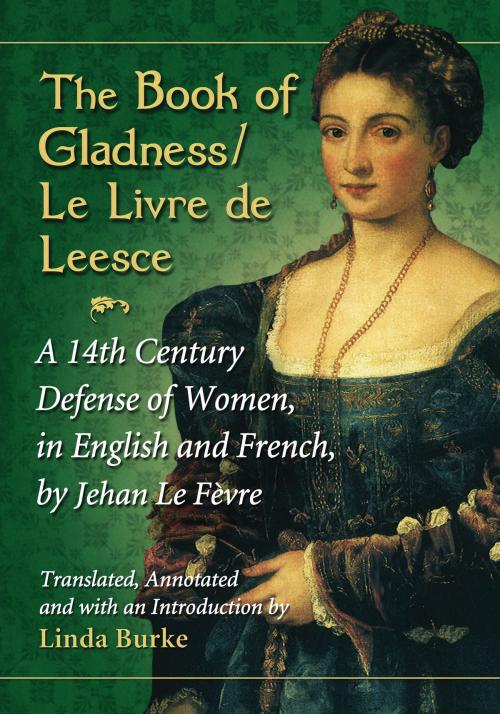The Book of Gladness / Le Livre de Leesce
A 14th Century Defense of Women, in English and French, by Jehan Le Fevre
Nonfiction, History, Medieval, Fiction & Literature, Literary Theory & Criticism, Religion & Spirituality| Author: | Jehan Le Fèvre | ISBN: | 9781476612492 |
| Publisher: | McFarland & Company, Inc., Publishers | Publication: | October 11, 2013 |
| Imprint: | Language: | English |
| Author: | Jehan Le Fèvre |
| ISBN: | 9781476612492 |
| Publisher: | McFarland & Company, Inc., Publishers |
| Publication: | October 11, 2013 |
| Imprint: | |
| Language: | English |
The Book of Gladness (ca. 1380) contains one of the most powerful, original, and influential pro-feminine voices of the late Middle Ages. In a spirited riposte to the misogynist tradition, Le Fèvre (with the help of Gladness, his lady-persona) boldly reinterprets the Bible while questioning ancient authorities in the light of “true” experience, especially his own. Despite its foundational importance, this work has never been translated into English. The present prose translation is lively and accessible, yet thoroughly grounded in scholarship. An Introduction explains the textual challenges hindering the full recognition of this classic up to now and elucidates its contribution to the medieval debate on the nature and status of women and marriage. Also included is the first-ever English translation and discussion of a newly discovered scribal interpolation on Christine de Pizan in a manuscript of Jehan Le Fèvre’s Lamentations. The bibliography provides the first complete list of manuscripts containing the French Lamentations and Le Livre de Leesce.
The Book of Gladness (ca. 1380) contains one of the most powerful, original, and influential pro-feminine voices of the late Middle Ages. In a spirited riposte to the misogynist tradition, Le Fèvre (with the help of Gladness, his lady-persona) boldly reinterprets the Bible while questioning ancient authorities in the light of “true” experience, especially his own. Despite its foundational importance, this work has never been translated into English. The present prose translation is lively and accessible, yet thoroughly grounded in scholarship. An Introduction explains the textual challenges hindering the full recognition of this classic up to now and elucidates its contribution to the medieval debate on the nature and status of women and marriage. Also included is the first-ever English translation and discussion of a newly discovered scribal interpolation on Christine de Pizan in a manuscript of Jehan Le Fèvre’s Lamentations. The bibliography provides the first complete list of manuscripts containing the French Lamentations and Le Livre de Leesce.















